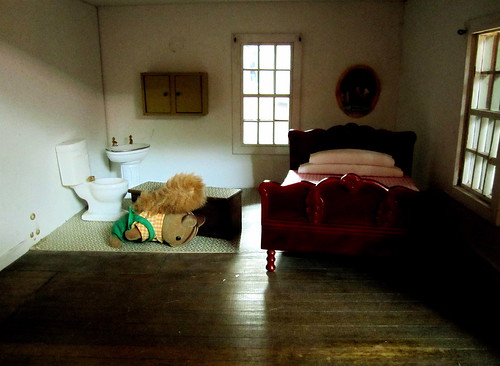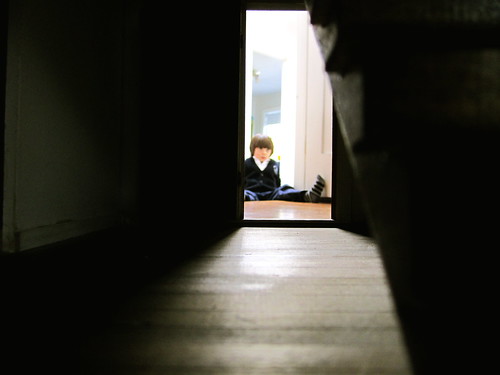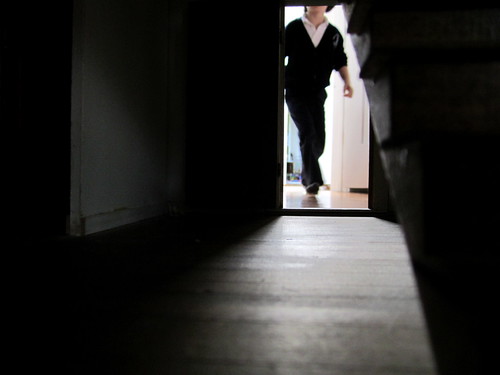I'd cry, of course. Get a hold of myself and then promptly sit Archer down to explain to him that our dog was soon to die. After the third time doing this, I realized I may have been premature with the death talk. Cooper is currently the beacon of health, lumpy but cancer free and even though I anticipate he will die eventually (obviously), I'm no longer surprised to hear the vet change his tune from "I'm sorry but the prognosis is bad," to "Yours is the healthiest Boxer we've ever had!" every other time we leave the vet.
Not to sound cold and calculated about our beloved dog but death is something we talk about in our household as matter of factly as we discuss homework or "family hat day" (we're currently doing "theme days" in our house. I totally get why my grandfather always wanted us to wear tee-shirts with wolves on them for family reunions. Turns out? Sometimes it's fun to all dress the same and go out to dinner.)
I digress... death is a subject we talk about without fear. I attended twelve funerals of High School friends alone in the last decade, one of whom was once my dearest friend. I've been the first on the scene of two fatal accidents, one involving friends. I mourned the deaths of children many times over when I chatted with chronic and terminally ill kids and teens as my job for four years. I was pregnant with Archer then. And I believe it has changed the way I parent as well as perceive death and being fearful of it. Especially as death relates to children.
If those kids taught me one thing (they taught me many things) it's that death becomes far less scary when you accept that it's going to happen. So from a very early age, I've discussed with Archer that he will someday die. That all of us will and not necessarily when we're "old" either. That children die sometimes, too. From illness. From accidents. That the people he loves very much will die and he will find himself very sad when they do. That the heartbreak we feel when we lose those we love is what makes us most human. Alive.
Archer has always had his own ideas about what happens when we die and I love exploring that with him - discussing where he thinks he'll go and where he feels he has been before.
Mortality is what makes us so interesting anyway so why not discuss death like we do life? After all, dying is the end goal, biologically. It's where we'll all end up. The last common bond we have with one another as creatures, alive for now...
Occasionally we look at pictures of our friends and family members who are no longer on this side of things. We discuss, tell stories, laugh, feel sad, feel happy, feel sad again. And in the same way we occasionally talk about what will happen when Cooper's cancer comes back. When our other dog, Zadie dies. When mommy dies. And daddy. Gooey and Papa and Nana and Great Grandpa. We talk about how much we'll miss each other when we are no longer able to hold each other with our bodies but that we'll forever hold onto each other with our minds, our stories and words, our hearts. And in the meantime... how fantastic that we get to, right? And we do. Constantly. We pile on top of each other like puppies and tell each other all day long how much we love each other. Because we can. Because someday that won't be the case. Que sera. C'est la vie. Life is short. Etc.
I don't understand why a parent would lie to their children about death. It's one of those things that, frankly, blows my mind. Kind of like lying to kids about where babies come from. Of course these things are difficult to talk about. All the fascinating stuff is. Complex and challenging. Emotionally daunting. Easier to ignore than face. Overwhelming, clearly. But if we can't talk openly about the certainties of life then where does that leave us as parents? Isn't it better to prepare our babes for emotional hardship? For sexual awareness? For real life? Isn't it more beneficial to our kids to hear these things from us? As opposed to some kid on the playground? A Pixar film? Personally, I rather have these kinds of discussions at home. Where it's safe and so are they to fill in their own blanks.
It's my job to teach them the facts I am sure of but equally my job to give them the space to explore their own ideas, form their own spiritual views, construct their own philosophies based on the knowledge they aquire through their own instincts.
Personally? I think we underestimate children and their capacity to understand these things. If I have learned anything as a parent it's that children, though young in years, have the kind of ageless wisdom we too often overlook.
I know there are many of you who will disagree with my logic here and I understand completely why you would do so. I have dear friends who don't believe in talking to their kids about death until their kids are old enough to fully grasp it. (But are we ever old enough to fully grasp death?) A lot of this depends on religious affiliation and beliefs, I realize. The subject of death soon poses the question, "what happens when we die?" And although I don't believe in passing on my beliefs to my children, I do think a child is never too young to think existentially about life and death and everything in between. That we do them a disservice when we assume otherwise, perpetuating fear in our children before they even know what it means to be afraid.
"Death" after all, isn't a four letter word but "fear" certainly is.
***
I'd especially love to hear from you on this topic. How do you approach the subject of death with your children? How have they responded? Thanks in advance for your insight and sharing.
GGC




